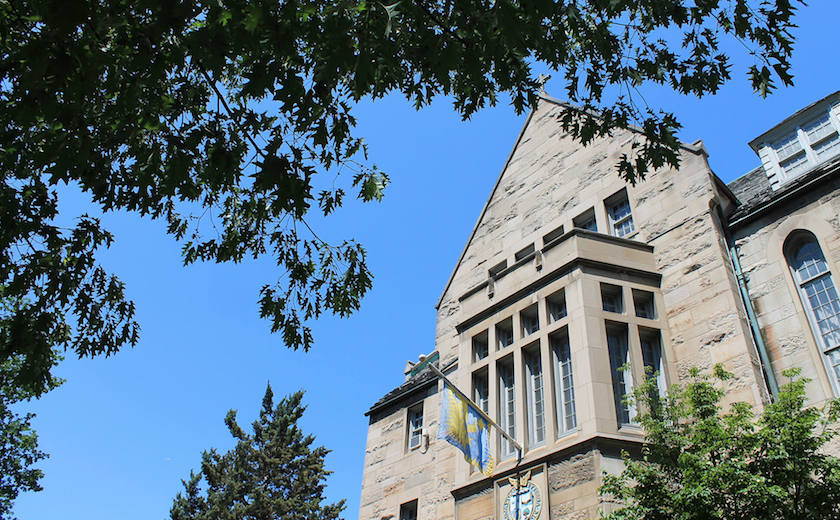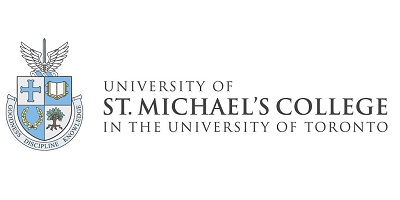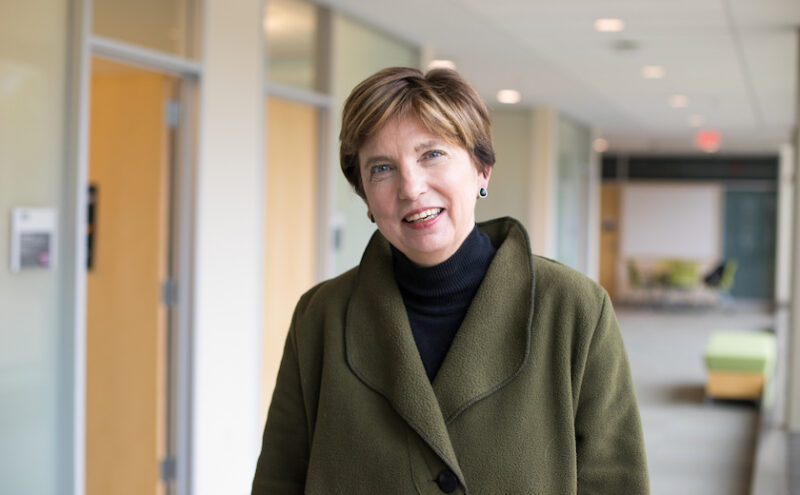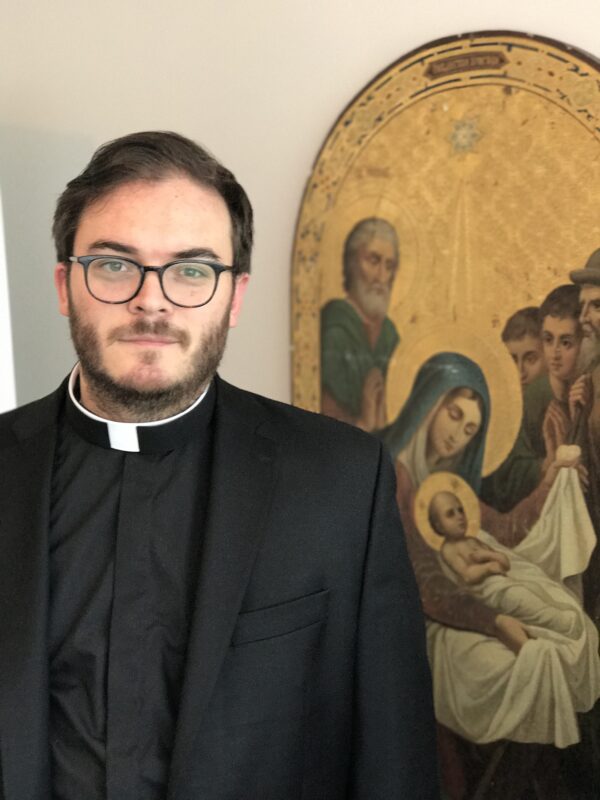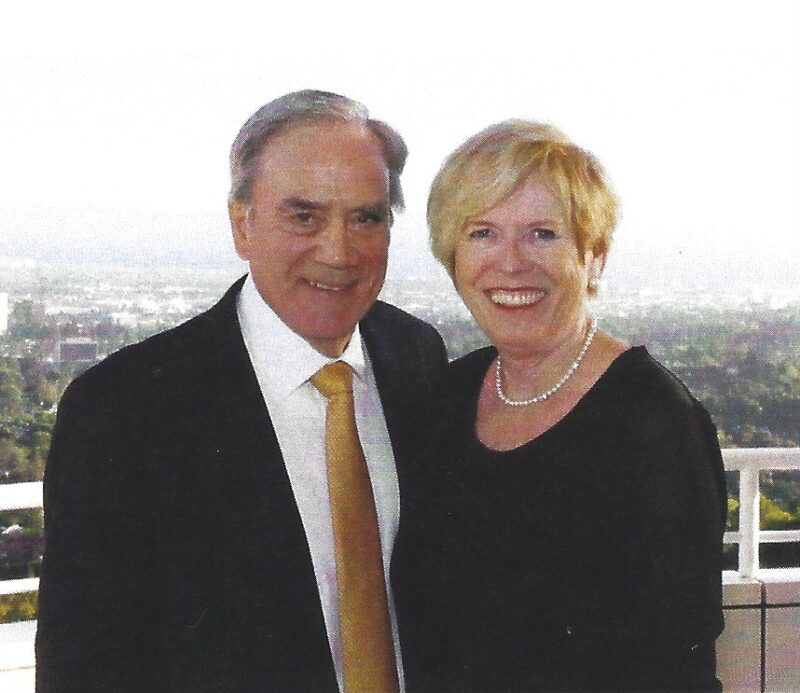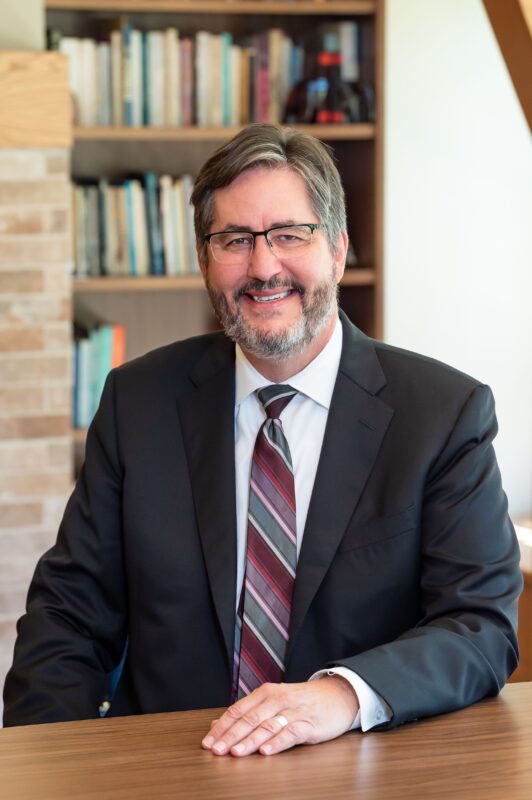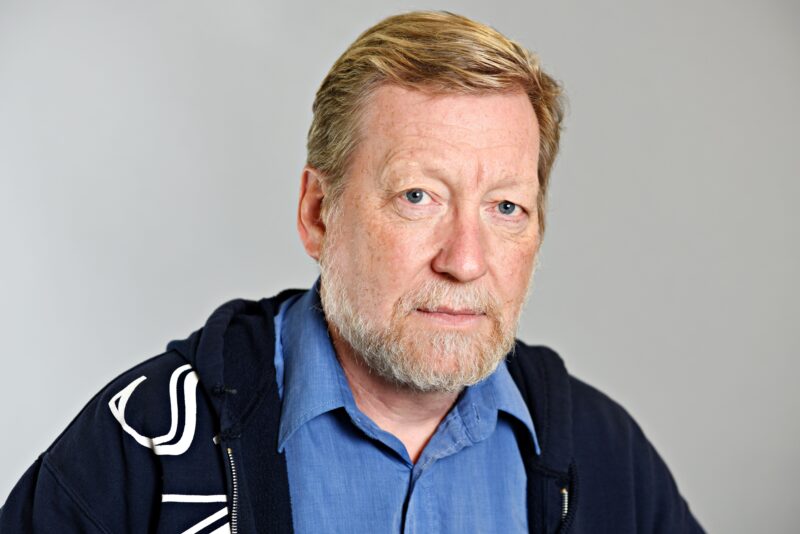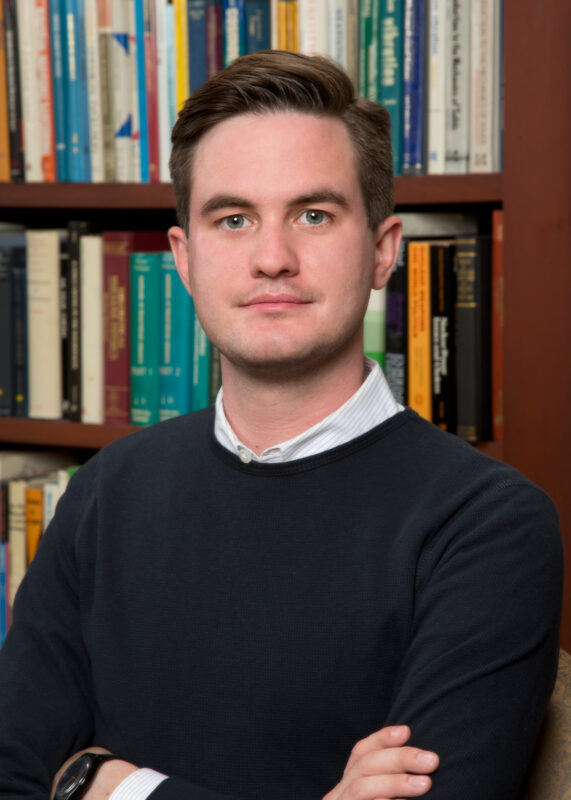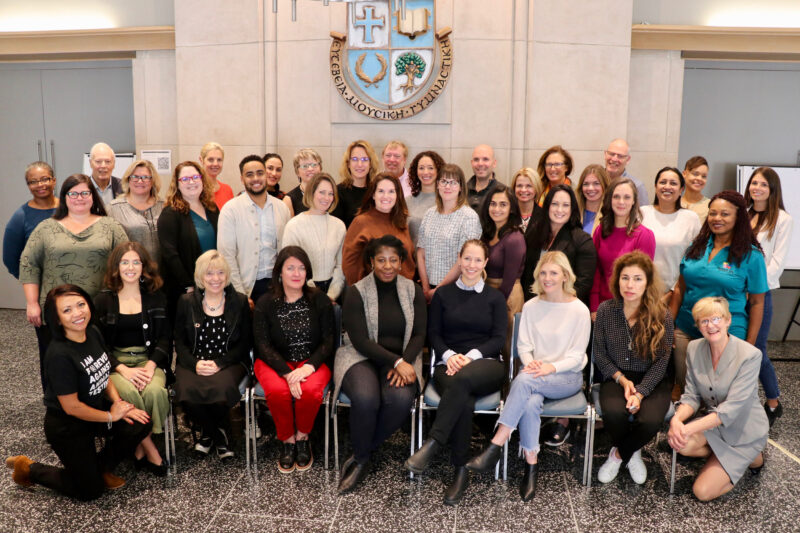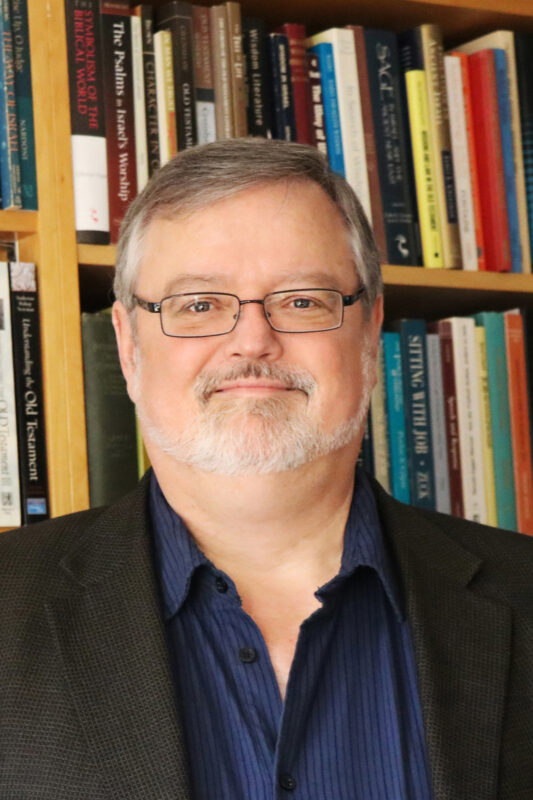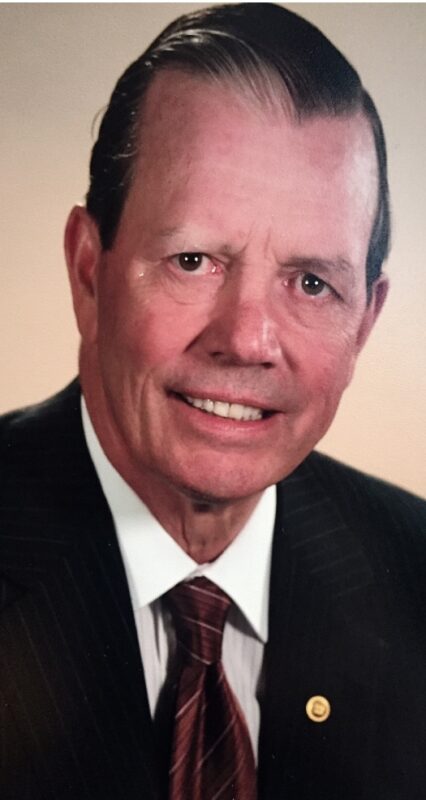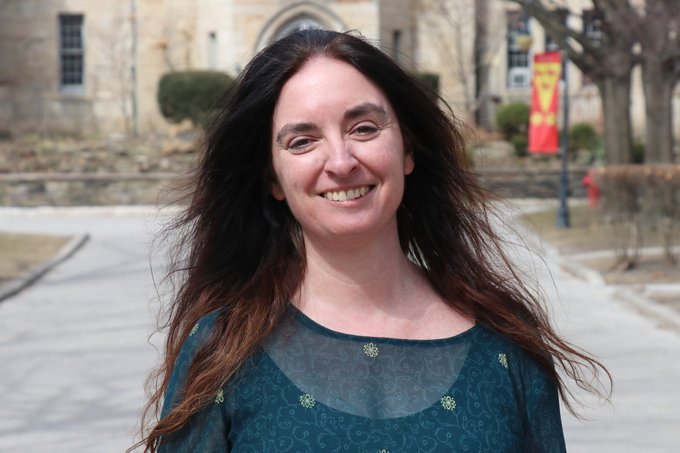The Association of Catholic Colleges and Universities in Canada (ACCUC) is pleased to learn of Pope Francis’ decision to visit Canada with the goal of reconciliation with the Indigenous communities of this land.
This past June, the ACCUC published a statement requesting that Pope Francis formally apologize to Canada’s Indigenous communities for the role that the Church played in operating over 60% of the nation’s residential schools. It is our hope that the pope will use this opportunity to offer a sincere apology to the victims, survivors, and descendants of survivors. We also expect that the pope will seek forgiveness in light of the discovery of the unmarked mass graves of school children found near several former residential schools.
While we recognize that a papal visit and apology will not undo the abuse, suffering, and trauma endured at the residential schools, we do feel that this important gesture, one specifically called for by the Truth and Reconciliation Commission Calls to Action, will be an important step on the path to reconciliation, forgiveness, and healing.
About Us
The Association of Catholic Colleges and Universities in Canada (ACCUC) is an organization of twenty postsecondary academic institutions located across all parts of Canada. ACCUC acts as the official voice for Catholic higher learning in Canada, as it seeks to spread “the spirit of learning” throughout the country.
Sincerely,
Peter Meehan, Ed.D.
Chair, ACCUC
President and Vice-Chancellor, St. Jerome’s University, Waterloo
John Cappucci, Ph.D.
Vice-Chair, ACCUC
Principal and Vice-Chancellor, Assumption University, Windsor
Christopher Adams, Ph.D.
Immediate Past Chair, ACCUC
Rector, St. Paul’s College, Winnipeg
Chantal Beauvais, Ph.D.
Rectrice, Université Saint Paul/Saint Paul University, Ottawa
Shawn Flynn, Ph.D.
President, St. Joseph’s College, Edmonton
Lauretta Frederking, Ph.D.
President, Brescia University College, London
Rob Harasymchuk, M.B.A.
President and Vice-Chancellor, St. Peter’s College, Muenster
Sami Helewa, S.J., Ph.D.
President, Campion College, Regina
Michael Higgins, Ph.D.
Principal, St. Mark’s College, Vancouver
President, Corpus Christi College, Vancouver
David Malloy, PhD
President, King’s University College, London
Dawn Russell, Q.C.
President and Vice-Chancellor, St. Thomas University, Fredericton
Brigitte Quintal, BCL
President, College Universitaire Dominicain, Ottawa
Carl Still, Ph.D.
President, St. Thomas More College, Saskatoon
David Sylvester, Ph.D.
President and Vice-Chancellor, University of St. Michael’s College, Toronto
Gerry Turcotte, Ph.D.
President and Vice-Chancellor, St. Mary’s University, Calgary
Jason West, Ph.D.
President, Newman Theological College, Edmonton
Thomas Worcester, S.J., Ph.D.
President, Regis College, Toronto

Sheril Hook, Chief Librarian of the John M. Kelly Library at the University of St. Michael’s College, is pleased to announce that Robyn Jane Carino has been appointed as the undergraduate Summer Fellow in Digital Humanities at the Kelly Library. Ms. Carino was selected from a pool of undergraduates with experience in digital humanities. Ms. Carino is completing her honours degree in St. Michael’s Book and Media Studies program with minors in Anthropology and Digital Humanities. As the Summer Fellow, she will assist the Chief Librarian and Dr. James Ginther (Faculty of Theology) as they develop plans to create a digital humanities studio in Kelly Library. She will collect data about existing DH centres in North America and will assist in interviews of leading scholars in this field as St. Michael’s determines best practices for a DH studio. “I’m so excited to help create a plan for Kelly Library’s DH studio through research,” Ms. Carino said. Digital Humanities, she also noted, “has already made all the difference in enriching my undergraduate experience.”
The Summer Fellowship is funded by a generous grant from the Critical Digital Humanities Initiative (CDHI) at the University of Toronto. The CHDI seeks to “gather together researchers, students, and collaborators from both the humanities and the data sciences to tackle some of the most pressing challenges of our time.” St. Michael’s is proud to collaborate with the CDHI with this opportunity.
For Immediate Release – June 7, 2021
Statement on Residential School Discovery
The Association of Catholic Colleges and Universities in Canada (ACCUC) is saddened and appalled to learn of the terrible discovery of 215 children’s bodies at the former Kamloops Residential School. We are deeply disturbed by the role our church has played in this case and in the residential schools in general, and we understand that this discovery is likely only the first of more to come. To the entire Tk’emlups te Secwépemc First Nation and to the Indigenous community of Canada, we offer our deepest condolences and prayers.
As the leaders of Canada’s Catholic universities and colleges, we feel it is imperative that the suffering and loss of life experienced at the residential schools are never forgotten. As centres of learning, we re-commit our institutions to the importance of Indigenous education, and to listening and working with our Indigenous communities towards the goals of conscientization, reconciliation and healing. To these ends, we also request that the complete records of the residential schools be preserved and made available to all those who seek to learn from this horrific chapter in history.
Most urgently and with a filial heart, we join other Canadian Catholic organizations in urging the Canadian Conference of Catholic Bishops to request Pope Francis formally apologize to the survivors, their families, and to all of the Indigenous communities of Canada. We believe that the Holy Father’s apology will be important for addressing the Church’s reprehensible involvement in the federal residential school system, as well as serving as a critical start for the process of healing the multiple wounds of our Indigenous brothers and sisters.
Yours Sincerely,
Peter Meehan, Ed.D.
Chair, ACCUC
President and Vice-Chancellor, St. Jerome’s University
John Cappucci, Ph.D.
Vice-Chair, ACCUC
Principal and Vice-Chancellor, Assumption University
Chantal Beauvais, Ph.D.
Rectrice, Université Saint Paul/Saint Paul University, University of Ottawa
Shawn Flynn, Ph.D.
President, St. Joseph’s College
Andy Hakin, Ph.D.
President and Vice-Chancellor, St. Francis Xavier University
Rob Harasymchuk, M.B.A.
President, St. Peter’s College
Dr. Sami Helewa, S.J.
President, Campion College
Michael Higgins, Ph.D.
President and Vice-Chancellor, Corpus Christi/St. Mark’s College
Cheryl Jensen, M.Ed.
Interim Principal, Brescia University College
David Malloy, Ph.D.
Principal, King’s University College, Western University
John Meehan, SJ
President and Vice-Chancellor, Université de Sudbury/University of Sudbury
Brigitte Quintal, B.C.L.
Présidente/President, Collège Universitaire Dominicain/Dominican University College
Dawn Russell, Q.C.
President and Vice-Chancellor, St. Thomas University, Fredericton, New Brunswick
Carl Still, Ph.D.
President, St. Thomas More College
David Sylvester, Ph.D.
President and Vice-Chancellor, University of St. Michael’s College
Gerry Turcotte, Ph.D.
President and Vice-Chancellor, St. Mary’s University
Jason West, Ph.D.
President, Newman Theological College
Thomas Worcester, SJ
President, Regis College
About Us
The Association of Catholic Colleges and Universities in Canada (ACCUC) is an organization of over twenty postsecondary academic institutions located across Canada. The ACCUC acts as the official voice for Catholic higher learning in Canada, as it seeks to spread “the spirit of learning” throughout the country.
FOR IMMEDIATE RELEASE
University of St. Michael’s College and Umalia Collaborate on Brokering Multi-Stakeholder Partnerships
TORONTO, Canada November 10 / – This week the Diploma in Social Responsibility & Sustainability and Umalia are launching a “living learning laboratory” on multi-stakeholder partnerships. “This is a win-win collaboration,” says Kathryn Cooper, Program Manager. “Umalia is a leader in developing multi-stakeholder partnerships for social and environmental impact. Our students will be learning firsthand best practices while lending their expertise to the future sustainability of the project.”
Students from the 2020/21 Cohort of the Graduate Diploma in Social Responsibility & Sustainability will be studying the Climat’Eau project. This project, led by Umalia for the last three years, is a multi-stakeholder partnership in Benin, Africa involving local Beninese partners, the Sô-Ava municipal government and the Sô-Ava Collective of Civil Society Organizations, the Canadian company Technologies Ecofixe, and Université Laval. The purpose of the project has been to build resilience of populations against the effects of climate change in Benin.
“The students at the University of St. Michael’s College will be examining five aspects of the project and making recommendations to contribute to the reflection of the long-term sustainability of this partnership,” says Lucie Bourgeois, President and Founder of Umalia. “Our project team is looking forward to receiving an external perspective on this important project.”
The Benin project began in 2017 and is funded in part by the Government of Quebec under the International Climate Cooperation Program. In 2013 Umalia committed itself to the community of Sô-Ava in southern Benin, together with the local municipal government and the Collective of Civil Society Organizations (COSC) for a period of ten years. Umalia’s objective was to use its experience and expertise to support the community in its development efforts, to build resilience to climate change, to build value-creating partnerships with the private sector and to establish responsible and sustainable collaborative governance.
“The Team at Umalia live their values,” says Kathryn Cooper. “Each Member has committed to volunteer their time to advance this project. Their passion for ‘making a difference’ through multi-stakeholder partnerships is inspiring. I hope our students come away from this experience with the skills and enthusiasm to put these types of partnerships to work in their sectors, for social and environmental good.”
About Umalia
Umalia Inc. is a consulting firm founded on the strong belief that profit and societal engagement can and must go hand in hand. Therefore, Umalia helps organizations to design, implement and activate strategies and ecosystems to create sustainable value for both organizations and society.
About the Graduate Diploma in Social Responsibility & Sustainability
Thirty-five participants are accepted annually to St. Michael’s program, which attracts students from across Canada and around the world. This “work as you learn” program enables participants to take their career in Social Responsibility and Sustainability to the next level. Participants tackle and resolve a Sustainability/ESG challenge in their company in a major Action Project under the mentorship of faculty and co-learners; learn from global thought leaders; experience practical “real world” change management through the ExperienceChange™ Simulation and join a prestigious community of St. Michael’s Alumni in continuing education, sharing and networking. Graduates receive the post nominal letters G.Dipl.SR&S.
The Diploma is now taking applications for 2021/2022. Only 35 applicants are accepted. To apply, go to the Diploma in Social Responsibility and Sustainability Website. First Intake Deadline is April 30, 2021.
About the University of St. Michael’s College in the University of Toronto
The University of St. Michael’s College (USMC) is a Catholic institution of higher learning federated with the University of Toronto. USMC strives to offer students a transformative educational experience in a diverse and engaged community, encouraging and supporting students and graduates to share their gifts in the cause of the greater good.
A Business Advisory Committee ensures the Diploma program is relevant and experiential. Sustainability/ESG Leaders representing a broad range of business sectors provide advice and input.
For More Information Contact
Kathryn A. Cooper, Program Manager, Diploma in Social Responsibility & Sustainability
Phone: (519) 855-9491
Website: https://www.csr-stmikes.ca/
Delphine Orfila, Consultant, Societal Engagement, Umalia
Phone: (438) 725-0518
Email: Dorfila@umalia.ca
Website: www.umalia.ca
“The whole is greater than the part, but it is also greater than the sum of its parts.” (Pope Francis, encyclical Fratelli Tutti (3 October 2020), # 145.
We write to inform our communities that representatives of the Board of Regis College, and the Collegium of the University of St. Michael’s College, have met recently to explore a mutual desire to renew long-standing discussions regarding a closer institutional relationship between the two Catholic institutions.
We are pleased to report that these very fruitful meetings have led to the establishment of a Steering Committee that will oversee, on behalf of the two governing bodies, the formulation of an alliance between Regis and St. Michael’s. The work of the Regis-USMC Steering Committee and its anticipated sub-committees, and the deliberations of the respective governing bodies, will be guided by the following shared principles:
- The commitment to forge a world-class centre of excellence in Catholic theological study whose mission is to promote teaching, research, and formation to serve the needs of the Church and society, here in Canada and globally;
- The commitment to consult all stakeholders (including the administration, the faculty, staff, students and alumni/ae, of each institution, as well as the sponsoring religious orders/ congregations). The continuation and cultivation of a cordial relationship with the Archdiocese, while keeping the Cardinal informed of plans and on-going developments;
- The commitment to orient governance of Regis and St. Michael’s to a deepening union for the sake of enhancement of their mission.

David Sylvester, PhD
President and Vice-Chancellor
University of St. Michael’s College

Thomas Worcester, S.J., PhD
President
Regis College
Dr. John L. McLaughlin, Interim Dean of the Faculty of Theology, is pleased to announce that Dr. Hilda P. Koster will be joining the Faculty of Theology as an associate professor in Ecotheology. Dr. Koster comes to St. Michael’s from Minnesota’s Concordia College, where she held joint appointments in Religion, Gender Studies and Environmental Studies.
“The addition of Dr. Koster to our Faculty underscores the importance of both ecological and feminist theology to the University of St. Michael’s College,” says Dr. McLaughlin. “She will carry forward the groundbreaking teaching and research of eco-theologians Fr. Stephen Dunn and Dr. Dennis O’Hara, as well as the important work in feminist theology conducted by professors such as Sr. Ellen Leonard and Sr. Mary Ellen Sheehan.”
Dr. Koster will teach courses for the Faculty’s three basic degree programs—the Master of Theological Studies, the Master of Divinity and the Master of Religion Education degrees—as well as teach and supervise graduate students through the Graduate Centre in the Toronto School of Theology. In the 2020-2021 academic year her courses will include Introduction to EcoTheology, Catholic Social Teaching, and a new course titled Ecofeminism, New Materialism and Ecological Theology.
She will also help shape the activities and certificate program of the Faculty’s Elliott Allen Institute of Theology and Ecology (EAITE), which was established in 1991 to allow students to acquire a specialization in theology and ecology.
“The University of St. Michael’s College has been a leader in ecological theology through the Elliott Allen Institute. It is a privilege and an honour to further this tradition of visionary ecotheological education and scholarship,” says Dr. Koster. “My own work in ecological theology is done from an eco-feminist perspective. To me environmental and gender justice are interconnected.”
Born in The Netherlands, Dr. Koster received her Bachelor of Arts and Master of Divinity degrees from The University of Groningen. After further study at Princeton Theological Seminary and the Candler School of Theology at Emory University in Atlanta, she earned her doctorate at the University of Chicago.
Dr. Koster has published articles and book chapters on eco-feminist theology, and edited two books on Theology and Climate Change. The book Planetary Solidarity: Global Women’s Voices on Christian Theology and Climate Justice (Fortress, 2017), co-edited with Grace Ji-Sun Kim, gathers eco-feminist theological reflections on the intersection of gender and climate justice by feminist/womanist/mujerista theologians from both the minority and majority world. Together with Ernst Conradie, she published the T&T Handbook of Christian Theology and Climate Change (Bloomsbury, 2019) to create a dialogue between religion scholars, ethicists and theologians situated within a high carbon footprint context and those representing climate vulnerable communities in low carbon footprint world.
The Metropolitan Andrey Sheptytsky Institute (MASI) heads into the 2020-2021 academic year with new leadership and a new faculty position in Patristics.
Fr. Alexander M. Laschuk has been named Interim Executive Director of MASI following the retirement of Fr. Peter Galadza on June 30 of this year. Fr. Laschuk is a priest of the Ukrainian Catholic Eparchy of Toronto and Eastern Canada, and serves in numerous ministries, including as Judicial Vicar of Toronto’s marriage tribunal. Until recently, he was also economos, or finance officer, of the Eparchy of Toronto and Eastern Canada. Fr. Laschuk has civil and ecclesiastical doctorates in canon law from Saint Paul University and the University of Ottawa. His research interests include ecclesiology, penal law, and procedural law and he regularly publishes in these areas in addition to canonical consultancy and advocacy work with dioceses and clients across North America.
Fr. Laschuk has regularly taught with the Sheptytsky Institute since 2010, and continues to teach in the Faculty of Canon Law at Saint Paul University, Ottawa, where he served as Interim Director of the Sheptytsky Institute in 2013-2014.
Dr. Sean Argondizza-Moberg has joined MASI on a one-year Contractually Limited Term Appointment as an Assistant Professor in Greek Patristics. Specializing in Christian asceticism in late antiquity, Dr. Argondizza-Moberg earned his doctorate at Catholic University of America’s Center for the Study of Early Christianity. The position, located within the Sheptytsky Institute, is renewable to a maximum of three years. Dr. Argondizza-Moberg is currently working on a book on monasticism and classical culture.
“We are delighted to have both Fr. Laschuk and Dr. Argondizza-Moberg joining us,” says Dr. John L. McLaughlin, Interim Dean of the Faculty of Theology. “Fr. Laschuk is a skilled academic who will offer strong leadership at MASI as it looks toward the future, while Dr. Argondizza-Moberg’s work in Patristics will strengthen our offerings to students in this key field.”
The Sheptytsky Institute is an autonomous academic unit of the Faculty of Theology of the University of St. Michael’s College (USMC) in the University of Toronto (U of T). It specializes in Eastern Christian Studies, including the theology, spirituality, liturgy, history, and ecclesial polity of the Eastern Christian Churches, both Orthodox and Catholic. MASI students specialize in Eastern Christian studies within the basic-degree and graduate degree programs of St. Michael’s College. All degrees are conjointly conferred by St. Michael’s College and the University of Toronto.
June 24, 2020
The University of St. Michael’s College and The University of Toronto Faculty of Arts & Science are pleased to announce that astrophysicist Dr. Adam Hincks, S.J., will be the inaugural holder of the Sutton Family Chair in Science, Christianity and Cultures. The position, jointly supported by Arts & Science and an endowment to St. Michael’s from alumni members Dr. Marilyn and Thomas Sutton, will make a significant contribution to the body of scholarship on the intersection of these three key fields.
Alumni and generous donors to St. Michael’s, the Suttons have long envisioned a position dedicated to examining how Christianity, science and cultures interact and intertwine.
“Marilyn and I are pleased to make this gift of gratitude in support of the distinctive partnership of USMC (St. Michael’s) and U of T. Our education in the Humanities at USMC and Math and Physics at UofT gave us a strong foundation for further education and our professions,” says Mr. Sutton.
The Suttons have found in their own studies that exciting knowledge is found in the spaces between disciplines. The Sutton Family Chair will offer a distinctive opportunity to advance such understanding.
“The inquiries of Science, Christianity and Cultures are informed by intersecting strands of scholarship. This Chair will provide a locus for focused study of those intersections and facilitate the development of new knowledge,” Dr. Sutton says.
Dr. Hincks specializes in physical cosmology, which studies the evolution and overall structure of the universe. In 2004, he completed a B.Sc. in physics and astrophysics from U of T, while also earning the St. Michael’s College Gold Medal for the highest cumulative GPA in sciences for a graduating student. In 2009 he earned a Ph.D. in physics from Princeton University and then entered the Jesuit novitiate in Montréal. After pronouncing vows in 2011, he pursued philosophical studies at Toronto’s Regis College and later did a Bachelor of Sacred Theology at Rome’s Pontifical Gregorian University. Between these studies, from 2013 to 2015, he was a postdoctoral research fellow at the University of British Columbia. Most recently he has been completing a Master of Theology and Licentiate in Sacred Theology at Regis College. He was ordained to the priesthood in 2019.
“As an alumnus of St. Mike’s at the University of Toronto, where I did the undergraduate Astronomy and Physics specialist programme, I’m proud that my alma mater has created this creative position, and I’m delighted to be taking it up,” he says.
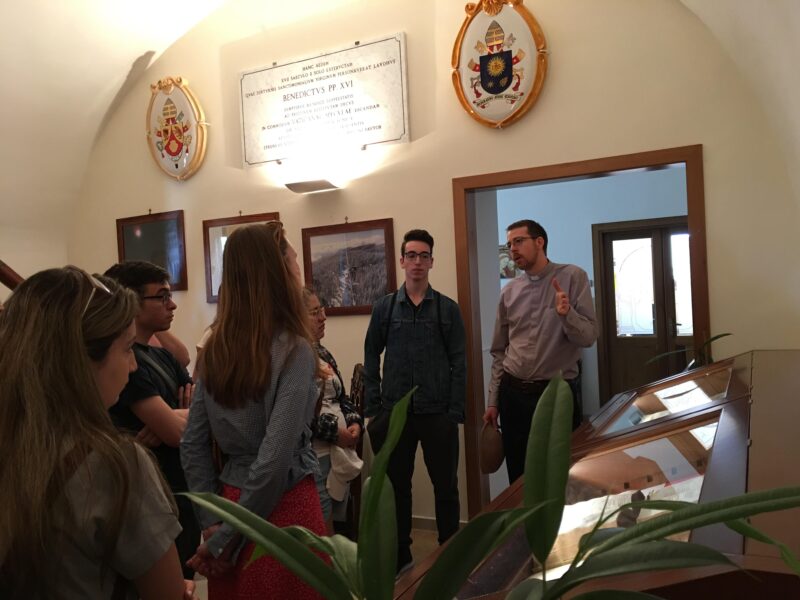
Among his various academic affiliations he is an associate scholar of the Vatican Observatory, while his research includes work with the Atacama Cosmology Telescope and the upcoming Simons Observatory, both located in Northern Chile, that are designed to answer fundamental questions about the history and structure of the Universe. In the past, he has also worked on the Canadian Hydrogen Intensity Mapping Experiment in British Columbia’s Okanagan Valley.
“I’m looking forward to continuing my scientific research in a context that also allows me to examine how it enters into conversation with Christianity and culture, both in the classroom and as a secondary research area,” Dr. Hincks explains.
“Dr. Hincks is a stellar addition to a growing group of very fine core faculty at St. Michael’s,” says Dr. Sylvester. “He reflects the caliber of research and teaching excellence St. Michael’s is providing to all University of Toronto students. Dr. Hincks’s work—especially in studying the interrelationships of Science and Christianity and their relationships to a variety of cultures—disproves the frequent assumption that science and religion have nothing positive to gain from encountering each other. We are very glad to welcome him home to St. Michael’s.”
Dr. Melanie Woodin, Dean of U of T’s Faculty of Arts & Science, agrees.
“The establishment of the Sutton Family Chair will advance research and teaching in multi-disciplinary ways that attest to the breadth and depth of the scholarship and learning that takes place in the Faculty of Arts and Science,” Dr. Woodin says. “I am delighted to recognize the generosity of U of T alumni and longtime supporters Tom and Marilyn Sutton. Their investment in this co-located Chair affirms the importance of creative and meaningful collaborations between the Faculty and one of its valued federated colleges, St. Michael’s.”
Dr. Hincks will begin his four-year appointment on July 1, 2020. The David A. Dunlap Department of Astronomy and Astrophysics will host Adam’s graduate appointment in the University of Toronto. In addition to teaching courses for the Department and also for the Christianity and Culture program sponsored by St. Michael’s College for students in the Faculty of Arts and Science, Adam will develop a course to be offered jointly for students in both programs, related to religion and science, in the time ahead.
Marilyn and Tom Sutton are graduates from St. Michael’s class of 1965. Marilyn graduated with a B.A. in English and French, completed a Phd at Claremont Graduate University and is Professor of English (Emerita) at California State University, Dominguez Hills. Tom graduated with a B.Sc. in Mathematics and Physics and is the retired chairman and CEO of Pacific Life Insurance Company.
June 8, 2020
Dear members of the St. Michael’s community,
I trust this message finds you in good health and holding up in these uncertain times. The 2019/2020 academic year has ended like no other, and I have watched our community respond with grace, courage and resilience to the challenges created by the COVID-19 pandemic. Once again, St. Michael’s is showing that even in very difficult times, our strength and generosity marks us as an anchor of hope in our community.
Social media use of #allinthistogether has gathered traction as the world responds to COVID-19, but I am particularly struck by how, at St. Mike’s, we really are in this together. Together, our students, faculty, alumni, and staff have worked to respond to these unique times, enabling classes to continue while ensuring the safety and security of campus, and the community. Students have been particularly resilient, and they have shown great understanding and patience in the face of a dramatically upended school year. As I look forward not only to the coming academic year but also to the future of St. Mike’s, I am confident that the lessons learned in these challenging days will help strengthen this incredible place, a place with compassion and community at its very heart.
When it became clear in mid-March that we needed a drastic response to the looming health crisis, creative problem-solving swung into action across the University. Within days, faculty and staff began offering classes and advising remotely, and students rose to the challenge. Residence students were able to pack up and head home early. The library remained open online, even offering a town hall on research. With a dedicated skeleton staff on campus to ensure that our students who could not leave were safe and supported, colleagues began working remotely, and virtual meetings became the norm. For the first time in history even Collegium and Senate meetings moved online.
This period will forever be remembered as a time when the world faced challenges above and beyond the norm, and we offer our support to those who are suffering. For St. Mike’s, the pandemic has forced us to sacrifice some much-loved traditions. We had to cancel spring reunion on campus and move to online anniversary activities, and the Class of 2020 missed out on an in-person, on-site convocation. As always, however, our community has responded with energy and hope. Whether it’s our Student Life team working on a virtual orientation for the incoming class, staff in the Registrar’s office taking additional time and care to respond to new and returning students’ concerns, or one of our students arranging to donate thousands of masks to protect those still on campus, this community is motivated by a concern for others, and it has been deeply moving and inspiring to witness.
We were in the midst of our St. Mike’s 180 planning when the pandemic hit. The pause in this project has allowed us time to reflect on our efforts to date and has affirmed what we already knew, that it is the strength of this community that is helping us weather this difficult storm and gives us hope for the future. We remain focused on our plans for renewal and I look forward to restarting conversations with you all about who we want to be as an institution and how we plan to achieve that. Obviously, we are stepping into a very different world, but St. Mike’s is prepared and must take up the mantle of leadership and think of new ways to build hope for our university and society, through our academic and student life programs and through our alumni and community partnerships.
Looking ahead to the 2020-2021 academic year, much remains unknown and difficult decisions must be made in the face of ongoing uncertainty. The health and safety of our community continues to come first, as well as the ability to reopen and resume operations when we are able to do so safely. The university is also facing challenges with regard to reduced revenues, and must also ensure that it remains fiscally sustainable. In early April, we implemented a hiring freeze, along with temporary redeployments. More recently, faced with prolonged shutdowns of parts of our campus and operations the University has worked with the United Steelworkers so that employees in our Facilities and Services Department and Physical Plant Departments can self-identify if they are willing to take a temporary leave. Staff who are affected by this decision have already heard from us directly.
Despite the challenges we are facing as the result of the pandemic, we remain committed to our community and charting a path forward. We are doing everything we can to sustain our workforce and adapt as we move through this crisis. We have established an advisory group, focused on plans for the fall, and we will continue to follow advice from public health and government guidelines. The University of Toronto has recently announced a plan to support employees in working from home where possible until at least September. St. Michael’s is part of this collaborative effort to achieve a gradual and safe reopening of the city’s workplaces.
Fortunately, in addition to calling on the expertise of our in-house resources, we can also tap into the knowledge and best practices of organizations such as Universities Canada to help us continue to do what we do best as a centre of learning and faith committed to building the common good.
Our Collegium remains a strong sounding board and a source of advice, responding wisely and compassionately to the unique concerns raised by the pandemic. Last week, the USMC Senate discussed the impact of COVID-19 on our academic community. We head into the coming year in especially capable hands, with former St. Michael’s Principal Dr. Mark McGowan returning as Interim Principal, as Prof. Randy Boyagoda becomes Vice-Dean, Undergraduate in the Faculty of Arts & Science at U of T. As well, Dr. John McLaughlin will again serve as Interim Dean of the Faculty of Theology as Dean James Ginther returns to the classroom following a leave. We are also very fortunate to have continued great student leadership, and I have already begun to work with Cianna Choo and the newly-elected executive of SMCSU.
While there is still so much we do not know about the course of this pandemic, rest assured that we will continue to communicate via email, social media and our website, stmikes.utoronto.ca, with important information about the 2020-2021 academic year and how and when the campus will reopen. Yes, we are in extraordinarily challenging times, but we are truly all in this together, and with your help St. Michael’s serves as an anchor of hope, an engaged and compassionate community dedicated to serving the greater good.
I am proud to be a member of this remarkable community.
Gratefully,
David Sylvester, PhD
President and Vice-Chancellor
University of St. Michael’s College
Principal Emeritus Dr. Mark McGowan will serve as the Interim Principal of the University of St. Michael’s College for the 2020-2021 academic year, President David Sylvester has announced.
“I am delighted that Dr. McGowan, with his extensive administrative experience both at St. Michael’s and at the University of Toronto, will be returning to Odette Hall,” says Dr. Sylvester. “His presence in the Principal’s Office, particularly in these challenging times, ensures that the academic affairs of St. Michael’s will remain in strong and capable hands.”
St. Michael’s Principal from 2002-2011, Dr. McGowan is an historian renowned for his work on the Catholic Church in Canada and the Great Irish Famine, as well as the lasting impact that the Famine’s mass migration had on Canada.
He has won multiple awards for both his teaching and writing, and is well known for his work in Catholic education, including the history of Catholic education in Ontario. He has served as a consultant to the Institute for Catholic Education. His latest book, It’s Our Turn: Carrying on the Work of the Pioneers of Catholic Education in Ontario was published by Novalis in 2019.
He is cross-appointed to U of T, where he holds tenure and has served as Deputy Chair of the History department (2017-19), as Senior Academic Advisor to the Dean of Arts & Science, International (2014-17) and as Acting Vice-Provost, Students, for the University of Toronto for part of 2013.
Dr. Sylvester also offers his congratulations to current Principal, Dr. Randy Boyagoda, on his appointment as Vice Dean, Undergraduate in the Faculty of Arts & Science at U of T.
“St. Michael’s has greatly benefited from Dr. Boyagoda’s four years as Principal,” Dr. Sylvester says. “His vision and creativity have led to a renewal of undergraduate education at St. Michael’s, including the hiring of new, full-time faculty as well as the roll-out of our new One Seminars, which are quickly becoming the most popular first-year programs at U of T. We are grateful for his many contributions.”
Dr. Boyagoda will continue to teach the Gilson Seminar in Faith and Ideas for St. Michael’s.
Dr. McGowan’s and Dr. Boyagoda’s appointments are effective July 1, 2020.
Assistant Professor, Christianity and Culture Stephen Tardif is now co-editor of The Hopkins Quarterly, an international journal of critical, scholarly, and appreciative responses to the lives and works of Gerard M. Hopkins, S.J., and his circle. He begins his duties at the same time as fellow co-editor Dr. Michael D. Hurley of Cambridge University.
“I’m delighted to be co-editing the Quarterly, which has been the major journal in Hopkins studies for almost a half-century,” Tardif says. “It’s also a great pleasure to extend The Hopkins Quarterly‘s long-standing connection to St. Michael’s College.” Past co-editors include St. Michael’s Professor Emeritus Joaquin Kuhn, who co-edited the journal for 25 years.
Founded in 1974, the journal publishes academic articles and book reviews, notes and notices, as well as special issues, from new and established scholars. The first issue of the journal under its new co-editors is now available, featuring articles on “The Wreck of the Deutschland” and Hopkins’ and Christina Rossetti’s poetic depictions of flux, and a number of book reviews.
TORONTO, Canada May 4 – A name change, a new award and an enhanced academic designation mark a season of transformation for the Corporate Social Responsibility and Sustainability program at the University of St. Michael’s College in the University of Toronto.
Graduates of the highly regarded program, now called the “Graduate Diploma in Social Responsibility and Sustainability” receive a Diploma and a designation marked by the post-nominal letters G.Dipl. SR&S (Social Responsibility & Sustainability).
“These changes reflect how the program has evolved since its beginnings almost 20 years ago,” says Program Manager Kathryn Cooper. “Meaningful, long-term social impact of business and not-for-profit partners has never been as important as it is in this time of COVID-19.”
“This program has evolved in response to the global trend toward embedding environmental, social and governance issues in business,” Cooper says. “To survive and thrive, organizations must focus beyond their bottom line, and create positive, long-term social impact.”
President’s Capstone Winners Announced
Graduates at the November, 2019 convocation were the first awarded the new diplomas. This convocation also marked the introduction of the new President’s Capstone Project Award, recognizing exceptional work in summative assignments. The inaugural winners were:
- “Indigenous Impact Report” by Alexandra Biron, recently promoted to Manager, Indigenous, Deloitte Canada.
- “A CSR Strategy for the Canadian Real Estate Association” by Sarah Thirnbeck, recently promoted to Associate Director, Strategic Impact, The Canadian Real Estate Association.
“The calibre of work produced by our CSR students is truly outstanding,” says University President Dr. David Sylvester. “The ethical concerns being discussed in this program reflect the long-standing values of St. Michael’s. CSR and Sustainability is a great example of how universities can have a transformational impact on society.”
Learning to Make a Difference in a Rapidly Changing World
Participants in the Graduate Diploma in Corporate Social Responsibility and Sustainability work full time while earning this university credential through a blended learning approach. Participants:
- tackle and resolve a CSR and Sustainability challenge in their company in a major Action Project under the mentorship of faculty and co-learners;
- learn Next Generation Practices from global thought leaders on the forefront of Sustainability and CSR (aligned with International Society of Sustainability Professionals Certification Body of Knowledge, the Embedding Project and the Transformational Company);
- use practical tools to assess, measure and integrate CSR and Sustainability into their organization;
- experience the practical real world application of CSR and Sustainability and change management through ExperienceChange™ Simulations; and
- join a prestigious community of Michael’s Alumni in continuing education, sharing and networking.
The Diploma is now taking applications for 2020/2021. Only 35 applicants are accepted. Join participants from Deloitte, Secure Energy, Tata Group Retail, SMART CENTRES, Dundurn Press, Chevron, Genuine Health, Civic Works Consulting, Candela Strategies, Children’s Hospital Foundations and more in the upcoming 2020/2021 Cohort. To apply, go to the Diploma in Corporate Social Responsibility and Sustainability Website. Second Intake Deadline is June 30th.
Participants start their learning in July, 2020 through an online Learning Management System and monthly live learning seminars. Module 1 in class will be held in Toronto, Canada, October 14 to 16, 2020. Module 2 and 3 in class will be held May, 2021 and November, 2021 respectively. To apply, go to the Diploma in Corporate Social Responsibility and Sustainability Website. See the program schedule, testimonials, past graduates and news about the program.
About the University of St. Michael’s College in the University of Toronto
The University of St. Michael’s College (USMC), federated with the University of Toronto, is a Catholic institution of higher learning founded by the Congregation of St. Basil, whose motto, “Teach me goodness, discipline and knowledge,” sets the tone for campus life.
A Business Advisory Committee ensures the CSR & Sustainability program is relevant and experiential. CSR and Sustainability Leaders from a broad range of industries from insurance to mining, including: The Co-operators, BMO Financial, Scotia Bank (ret.), Vermillion Energy, Centerra Gold , Aurora Cannabis, Kin&Co and Rotman School of Management (University of Toronto) provide advice and input.
For More Information Contact
Kathryn A. Cooper, Program Manager, Diploma in Corporate Social Responsibility & Sustainability
Phone: (519) 855-9491
Website: https://www.csr-stmikes.ca/
University of St. Michael’s College President David Sylvester is pleased to announce the appointment of Dr. John McLaughlin to a two-year term as Interim Dean of the Faculty of Theology, effective July 1, 2020.
Dr. McLaughlin served as the Faculty’s Interim Dean in the 2014-15 academic year prior to Dr. Ginther’s arrival.
“St. Michael’s is fortunate to have such a capable administrator with a strong familiarity and history in the Faculty” says Dr. Sylvester. “Dr. McLaughlin’s presence in the Dean’s office will help make this process seamless, and I look forward to working with him in this role.”
A professor of Old Testament/Hebrew Bible, Dr. McLaughlin earned a BA from St. Thomas University in Fredericton, NB before enrolling at the University of Toronto, where he earned an MA in Philosophy. He then studied Theology and Scripture at St. Michael’s Faculty of Theology, earning an MDiv and a PhD.
Professor McLaughlin joined the St. Michael’s faculty in 2002 after teaching for seven years at Wheeling Jesuit University in Wheeling, West Virginia. He is an Associate Member of the Graduate Faculty with the Department of Near and Middle Eastern Civilizations at U of T, and is a past President of the Canadian Society of Biblical Studies. He currently serves on the Editorial Board of the Journal of Hebrew Scriptures and as an Associate Editor of the Catholic Biblical Quarterly.
Current Dean Dr. James Ginther completes his five-year term on June 30 of this year. After a 12-month research leave, Dr. Ginther, a mediaevalist and historical theologian, will return to the Faculty to teach and conduct research.
Dr. Sylvester has expressed his gratitude for Dr. Ginther’s service over the course of his term in the Dean’s office. “I would like to thank Dr. Ginther for his tremendous service to our community as a member of the President’s Advisory Group and Senior Administration team, in his leadership within the Toronto School of Theology, and in many other collaborative initiatives, including in his field of expertise at the Pontifical Institute of Medieval Studies and the Centre for Medieval Studies,” he says. “I look forward to Jim’s return to campus following his leave and to his renewed leadership at the University.”
President David Sylvester is pleased to announce the establishment of the Comper Professorship in Medieval Studies at the University of St. Michael’s College in the University of Toronto. This newly endowed position has been made possible by a foundational investment by St. Michael’s alumnus, Dr. Tony Comper, C.M., L.LD. (Hon). Dr. Sylvester is also delighted to announce that Dr. Alison More is appointed the inaugural holder of the Comper Professorship. Dr. More is a highly regarded Latinist whose research investigates the intersections of social and religious culture in late-medieval Northern Europe.
The donation reflects Dr. Comper’s firm belief that studying the humanities offers invaluable benefits both personally and professionally – and that St. Michael’s is on the right path with its renewal as a vibrant centre of undergraduate education at U of T. “Studying liberal arts, in particular literature, provides significant insight into human nature; (it offers) essential knowledge in interpersonal skills, the most important skill for success in business and indeed in life,” says Dr. Comper, who is the retired President and CEO of BMO Financial Group.
Dr. Comper recently returned to campus to take courses in Medieval Studies, a Faculty of Arts and Science undergraduate program sponsored by the University of St. Michael’s College that is available to all students in Arts and Science at the University of Toronto. This has given the philanthropist a front-row seat for the revitalization of Arts and Science undergraduate programs sponsored by St. Michael’s. Pleased with what he has seen, he has offered the university a unique hybrid investment in teaching by funding this position. The gift is comprised of a multi-million dollar bequest, and the promise of annual funding, effective immediately, in the intervening years to cover salary and benefits. This faculty position is one of six that St. Michael’s implemented in 2017 as part of its focus on teaching excellence in the four undergraduate programs it sponsors: Book and Media Studies, Christianity and Culture, Celtic Studies, and Medieval Studies.
Dr. Alison More came to the College from the Centre for Medieval and Early Modern Studies at the University of Kent where she designed and taught core courses on Latin and palaeography. She and the other assistant professors who joined the St. Michael’s community and broader University of Toronto three years ago have become a vital part of social and academic renewal. They have enhanced students’ learning experience through their own engaged and creative teaching and research interests and have contributed a great deal to the culture and community of the College beyond the classroom by supporting student-run initiatives and presenting public lectures for alumni. The Comper gift is creating great excitement on campus, as it represents the first step in the campaign to ensure the professorships remain permanent.
“This generous gift is an extraordinary demonstration of the confidence in the renaissance under way at St. Michael’s,” says Dr. David Sylvester, President and Vice-Chancellor. “It’s also a model of funding for other professorships, and an ideal example of how St. Mike’s continues to renew itself through endowed legacy positions. We’re thrilled that an outstanding philanthropist like Dr. Comper has demonstrated his dedication to his alma mater in this way.”
“St. Michael’s and the wider U of T share a long tradition of international excellence in the field of Medieval Studies,” says Professor Meric Gertler, President of the University of Toronto. “Dr. Tony Comper’s wonderful gift will help to strengthen that tradition for future generations, and to accelerate the renewal of undergraduate education at the College. His generosity also builds on his long record of leadership in the University community, including his previous service as Chair of U of T’s Governing Council, as well as his and his late wife Elizabeth’s support for the Anne Tanenbaum Centre for Jewish Studies. We applaud this latest contribution to our collective success.”
About Medieval Studies at The University of St. Michael’s College
With its strong combination of intensive Latin study alongside explorations of theology, literature, history, culture, and manuscripts, Medieval Studies invites students not just to study the Middle Ages, but instead to join a great tradition of inquiry and discovery enlivened by the world-renowned professors who have taught Medieval Studies at St. Michael’s over the years, including Étienne Gilson, Jacques Maritain, Msgr. Edward Synan, Sr. Frances Nims, IBVM, Sr. Mary Arthur Knowlton, CSJ, and Colin Chase.
The University of St. Michael’s College has a long tradition of teaching and research in medieval disciplines and its library has rich resources in the field. The PIMS library, which is housed in the John M. Kelly Library, includes rare, non-circulating books and draws scholars from around the world. The University of St. Michael’s College recently signed a five-year Memorandum of Understanding with PIMS and the University of Toronto recommitting to collaborative work in research, teaching and publication.
For more information, please contact:
usmc.communications@utoronto.ca
(416) 926-2267
A new memorandum of understanding between the University of St. Michael’s College, the University of Toronto, and the Pontifical Institute of Mediaeval Studies (PIMS) heralds a renewed spirit of collaboration, says Dr. David Sylvester, President and Vice-Chancellor of the University of St. Michael’s College.
“This is much more than a piece of paper,” says Sylvester, who adds that having St. Mike’s Mediaeval Studies program, PIMS and U of T’s Centre for Medieval Studies all located in one city makes Toronto North America’s centre for research and study in the field. “[The MoU] reflects a new commitment from St. Mike’s to work with PIMS and U of T, and it opens doors to exciting possibilities for new cooperation.”
Dr. John Magee, who signed the MoU on behalf of U of T’s Centre for Medieval Studies (CMS), agrees.
“This is a starting point for future building and development,” explains Magee, who is a member of U of T’s Classics Department and the Collaborative Program in Ancient and Medieval Philosophy, as well as a Senior Fellow at PIMS. He assumes the role of Director of the Centre for Medieval Studies this coming July.
The five-year memorandum formally expresses a commitment on the part of the three signatories to work together to further engage with the mediaeval period through research, teaching, and publication. While each party remains distinct, the agreement suggests possibilities such as joint academic seminars or colloquia, as well as scholarly collaboration. It also notes that the PIMS library collection will continue to be housed in the John M. Kelly Library at St. Mike’s.
As a repository library with rare, non-circulating works, the PIMS library draws students from around the world to study everything from paleography to Latin, notes Sylvester.
Annual meetings will see the three parties discuss areas of mutual interest, opportunities for further engagement, and operational issues.
The agreement comes as the undergraduate Mediaeval Studies program, delivered at St. Mike’s as a sponsored program from Faculty of Arts and Sciences, is flourishing, and Sylvester notes that PIMs has “welcomed our undergrads with open arms,” inviting them to be part of the PIMS community.
Other natural “cross fertilization” sees PIMS’ Mellon Fellows teaching undergraduate students at St. Mike’s, for example, while PIMS has offered teaching and office space to St. Mike’s professors and students, adds Sylvester.
“This document summarizes the historic tripartite relationship between PIMS, St. Michael’s, and U of T and reflects people’s intentions going forward,” says PIMS Praeses (president) Dr. Richard Alway. “It builds on relationships in new ways and can be developed further.”
The first humanities research institute in Canada, PIMS was founded under the auspices of St. Michael’s and the Basilian Fathers in 1929, and was decreed a pontifical institute in 1939, notes Alway. From 1958 to 2005, it was a graduate school and research centre within St. Michael’s, but governance changes at the university saw PIMS establishing independent status to maintain its standing as a pontifical institute.
In addition to its world-class library, which Alway labels “a jewel, a centrepiece of our research,” and the post-doctoral Mellon Fellowships, PIMS also hosts a vibrant publishing program which produces about ten scholarly works a year, he notes, all added draws for mediaeval scholars.
“These are exciting times. St. Michael’s remains committed to undergraduate mediaeval studies, and students are attracted to what our professors and our supportive community can offer,” says Sylvester. “Our continuing goal is to build even more synergy with these important partners, precisely at this time when students and society are rediscovering the importance and the beauty of studying the humanities.”
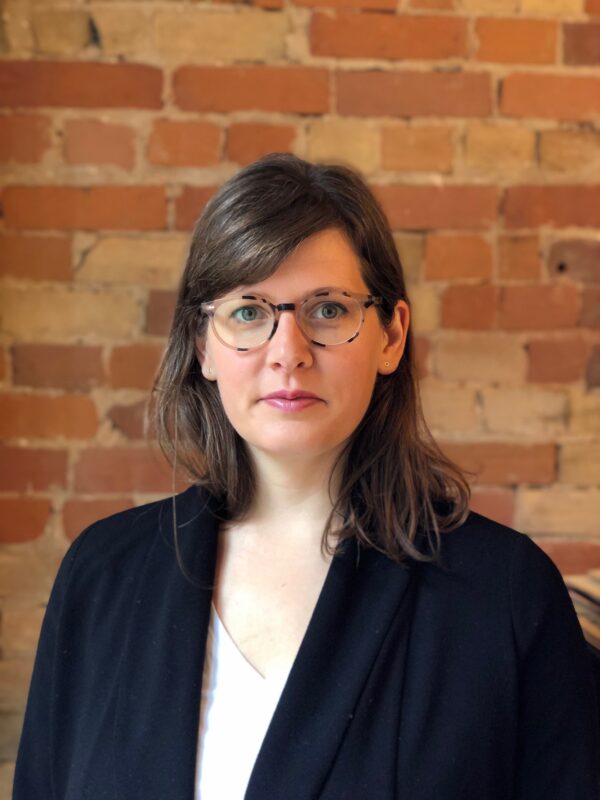
Toronto, ON, Dec. 5, 2019 – The University of St. Michael’s College has appointed Lisa Rae its Director, Office of the President, effective December 6, 2019. In this role, she will oversee the operations of the Office and support in identifying priority issues, facilitating planning and driving project-based initiatives across the University. Rae brings a wealth of policy, operations, communications, and management experience from working both inside and outside of local and provincial government.
Most recently, Rae was Director of Operations and Senior Policy Advisor in the Minister’s Office for Advanced Education and Skills Development, where she worked collaboratively to help set the strategic direction for the office to support the Minister and the government. She was also responsible for delivering key policy priorities including the transformation of the Ontario Student Assistance Program and the introduction of legislation recognizing Indigenous Institutes. Prior to that, Rae was at the Council of Ontario Universities, where she provided project management, policy support and direction to many working groups and committees of senior leaders from universities.
“I’m passionate about higher education and the role that universities play both inside and outside the classroom to build engaged citizens,” Rae said. “I’m excited to join the St. Mike’s community and work in an institution that prioritizes teaching the whole person, and I look forward to working with all members of the St. Mike’s community and the University of Toronto.”
“St. Michael’s is delighted to welcome Lisa Rae into this important leadership role in the Office of the President,” St. Michael’s President David Sylvester, PhD said. “Her background in strategic leadership and stakeholder engagement will be invaluable as we continue to deepen our relationships and pursue new opportunities with community and educational partners locally and globally.”
-30-
About the University of St. Michael’s College
St. Michael’s College was founded in 1852 in partnership with the Congregation of St. Basil in Annonay, France, and became an official Federated College in the University of Toronto in 1910. It remains a centre of Catholic thought, and inspires socially conscious and intellectually engaged students through its undergraduate programs, its graduate Faculty of Theology and its Continuing Education division.
For more information, please contact:
Martyn Jones
Office of Communications
University of St. Michael’s College
(416) 926-2291
martyn.jones@utoronto.ca
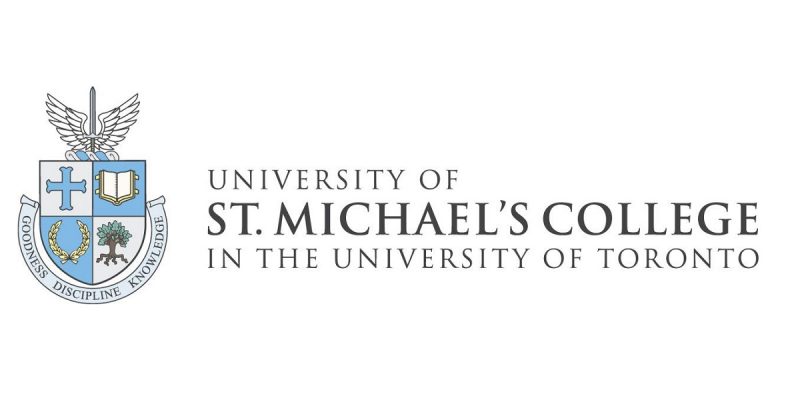
TORONTO, Oct. 23 – Four projects demonstrating the impact of business and governments’ Social Responsibility and Sustainability practices on youth mental health, Truth and Reconciliation, municipal CSR engagement, and the real estate sector have earned nominations for the inaugural USMC President’s Capstone Project Award for the Graduate Certificate in CSR/Sustainability.
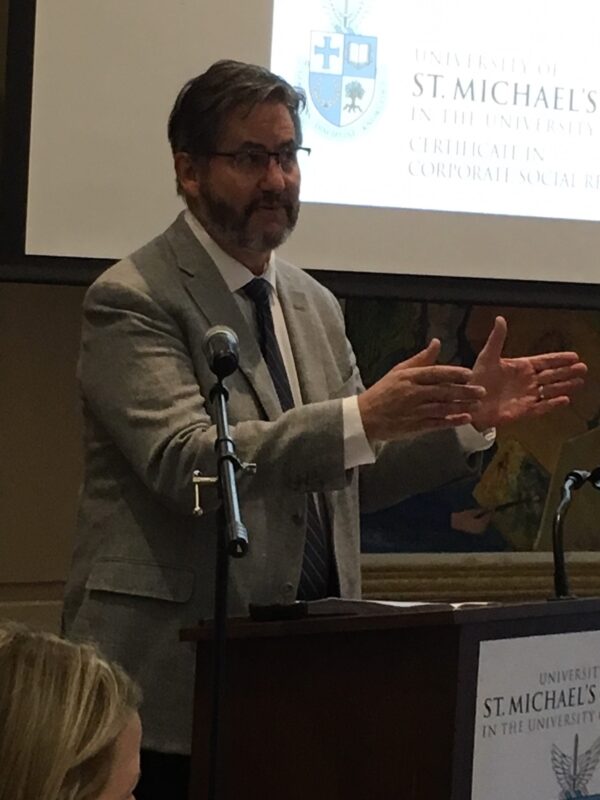
The nominated projects are:
- “Stand Up! For Youth Mental Health: Will Community Investment Pay Off for Family Channel?” by Nikki Byrne
- “Indigenous Impact Report” by Alexandra Biron
- “Bringing to Life a CSR/Sustainability Conversation for the City of Mississauga” by Andrea McLeod
- “A CSR Strategy for the Canadian Real Estate Association” by Sarah Thirnbeck
“The Corporate Social Responsibility program is a vital offering at the University of St. Michael’s College, helping business and institutions focus on ways to become better – and more effective – global citizens, whether environmentally, socially, or economically,” says St. Michael’s President David Sylvester. “Program participants return to their workplaces as leaders engaged in social impact that benefits their employers and society. We want to celebrate these extraordinary changemakers with this new award.”
Thirty participants are accepted annually to St. Michael’s CSR program, which attracts students from across Canada and around the world from sectors as diverse as banking and manufacturing to education and NGOs. Participants meet on campus for three sessions over a 13-month period and connect online throughout the program, engaging in readings, webinars, videos, and shared reflections on ethical behaviours that create shared value that contributes to society’s wellbeing. The summative capstone assignment sees participants work with a mentor from their field on a project to apply knowledge, skills and perspectives learned or honed during the program.
Projects considered for the President’s Capstone Award must be distinguished in what they achieve or propose in one or more of the following criteria: 1) advancing social and/or environmental impact; 2) introducing innovative practices in social and environmental responsibility, sustainability, ESG and/or 3) significantly advancing social and environmental responsibility, sustainability and/or ESG to the creator’s organization.
Nominated projects were judged by a panel which includes Kaz Flinn, Chair, St. Michael’s advisory committee for the CSR program; Dr Stephen Scharper, associate professor at the School of the Environment and the Department for the Study of Religion at the University of Toronto; and Mary Ann Sayers, a graduate of the CSR program and senior business consultant at West Pine Consultants Inc. For more information, please see the Certificate in Corporate Social Responsibility/Sustainability Website.
About the University of St. Michael’s College
The University of St. Michael’s College (USMC), federated with the University of Toronto, is a Catholic institution of higher learning founded by the Congregation of St. Basil, whose motto, “Teach me goodness, discipline and knowledge,” sets the tone for campus life.
A Business Advisory Committee ensures the CSR program is relevant and experiential. CSR/Sustainability Leaders representing a broad range of industries from insurance to mining, including: The Co-operators, BMO Financial, Scotia Bank (ret.), Vermillion Energy, Centerra Gold , ESG Ledger, Conference Board of Canada, and Rotman School of Management (University of Toronto) provide advice and input.
For More Information Contact
Kathryn A. Cooper, Program Manager, Certificate in Corporate Social Responsibility & Sustainability
Phone: (519) 855-9491
Website: https://www.csr-stmikes.ca/
The 20th annual Media Ecology Association Convention brought together hundreds of scholars for panels and presentations on ethical issues at the cutting edge of technological development and society today. Presented by St. Michael’s, the intellectual home of media ecologist, critic and theorist Marshall McLuhan, the conference also provided an opportunity to recognize the achievements of scholars continuing the legacy of McLuhan’s work.
With congratulations to all winners, here are the awards presented at the 2019 MEA Convention:
| The Walter J. Ong Award for Career Achievement in Scholarship | Werner Kelber |
| The Neil Postman Award for Career Achievement in Public Intellectual Activity | Nora Bateson |
* * *
| The Marshall McLuhan Award for Outstanding Book in the Field of Media Ecology | Mark A. McCutcheon for The Medium is the Monster: Canadian Adaptations of Frankenstein and the Discourse of Technology |
| The Walter Benjamin Award for Outstanding Article in the Field of Media Ecology | Nicholas Grodsky, Julia Hildebrand and Ernest Hakanen for “Screens as Human and Non-Human Artefacts: Expanding the McLuhans’ Tetrad” |
| The Erving Goffman Award for Outstanding Scholarship in the Ecology of Social Interaction | Laura Tropp for Grandparents in a Digital Age: The Third Act |
| The Susanne K. Langer Award for Outstanding Scholarship in the Ecology of Symbolic Form | Eviatar Zerubavel for Taken for Granted: The Remarkable Power of the Unremarkable |
| The Dorothy Lee Award for Outstanding Scholarship in the Ecology of Culture | Shannon Mattern for Code and Clay, Data and Dirt: Five Thousand Years of Urban Media |
| The Lewis Mumford Award for Outstanding Scholarship in the Ecology of Technics | Antoine Bousquet for The Eye of War: Military Perception from the Telescope to the Drone |
| The Harold A. Innis Award for Outstanding Thesis or Dissertation in the Field of Media Ecology | Melinda L. Farrington for The Role for Rhetoric: Ong’s Ramus Research as a Hermeneutic Opening for Mediated Communication |
| The John Culkin Award for Outstanding Praxis in the Field of Media Ecology | Julia Hildebrand and Barry Vacker, Curators, for Hot and Cool in the Media(s)cene: A McLuhan Style Art and Theory Project |
| The Louis Forsdale Award for Outstanding Educator in the Field of Media Ecology | Thomas Gencarelli |
| The Jacques Ellul Award for Outstanding Media Ecology Activism | Andrew McLuhan for The McLuhan Institute |
| The James W. Carey Award for Outstanding Media Ecology Journalism | Mathew Ingram |
| The Christine L. Nystrom Award for Career Achievement in Service to the Field of Media Ecology | Fernando Gutierrez Cortes |
| The Edmund S. Carpenter Award for Career Achievement in Editing in the Field of Media Ecology | Phil Rose |
* * *
Gifted Educator and Founder of the first program providing executive education in the field of Corporate Social Responsibility recognized by University of St. Michael’s College alumni
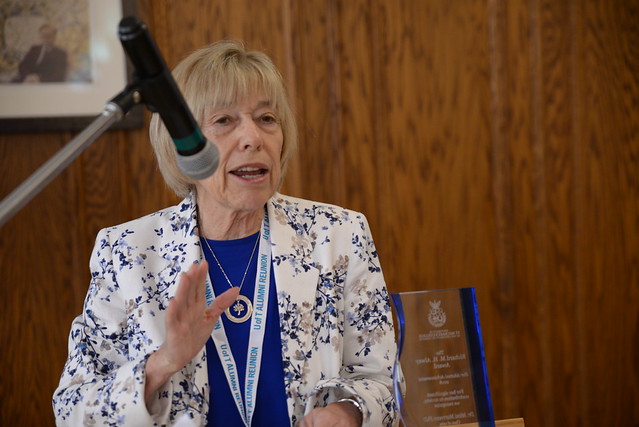
Dr. Mimi Marrocco (Class of 1969) has received the 2019 Alway Award, an honour in recognition of her decades of service and important contributions to the life and reputation of the College. As her former students and colleagues attest, her work—especially in the area of Continuing Education—has influenced the lives of thousands of people.
Former University of St. Michael’s College President Sr. Anne Anderson, CSJ said Dr. Marrocco “gifted USMC with her passion for Continuing Education.” That passion, Sr. Anne said, yielded “innovative, cutting-edge programs across a broad spectrum of interests,” including “our internationally known Certificate in Corporate Social Responsibility.”
Over 300 participants from across Canada and over 20 countries have gone through the CSR program, and over 250 alumni from the program hold positions as VP, Director, or Manager in CSR and Sustainability capacities.
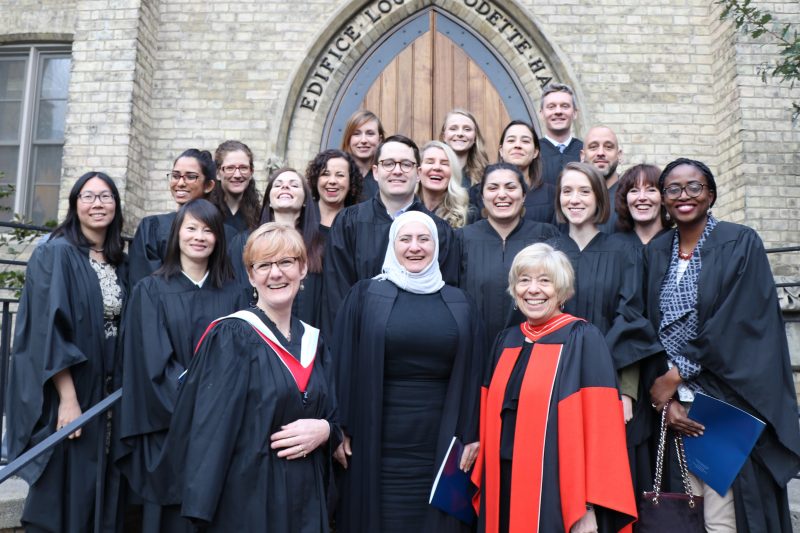
“Mimi is the heart and soul of the CSR Certificate Program,” CSR Program Manager Kathryn Cooper said. She described Dr. Marrocco’s contribution to the field in Canada as decisive: “Dr. Marrocco developed an innovative collaboration with the Conference Board of Canada to launch in 2002 the first program providing executive education in the field of Corporate Social Responsibility. This program created the platform for the very first developments of the body of knowledge, best practices, mentorship and action learning projects in business for Corporate Social Responsibility.”
As the first recognized, professional University Credential in Canada related to CSR, the St. Michael’s program Dr. Marrocco founded has also created a network of alumni and mentors in the field. Program participants receive mentorship support for 13 months, which helps them achieve first-time success in implementing the CSR/Sustainability projects they undertake during the program. To date, participants have implemented over 200 action-learning projects at their companies and organizations, including numerous CSR, Sustainability and Community Investment strategies.
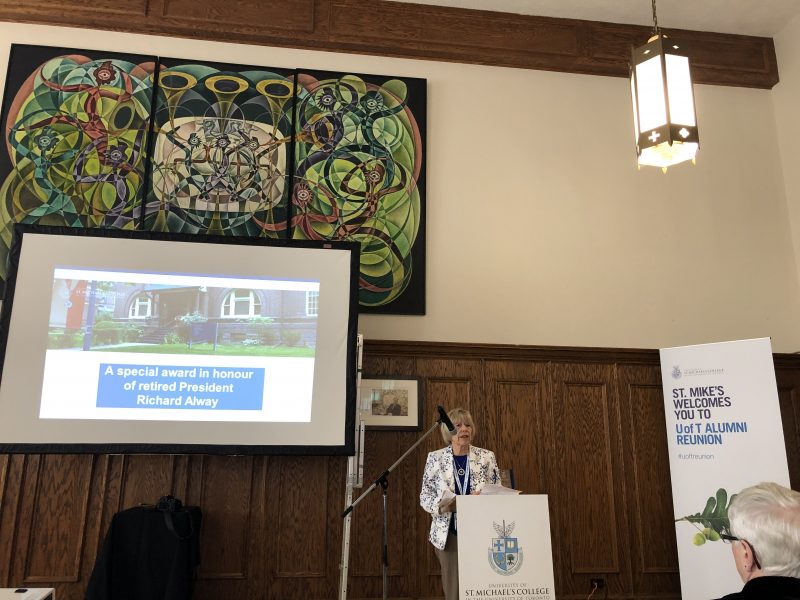
Dr. Marrocco’s former students describe her as a dynamic leader whose talent for teaching is matched by her care for them. “Mimi is so lovely and insightful,” said one, while another said that Dr. Marrocco “has been instrumental in helping me to open my mind to different perspectives.”
After earning a BA from St. Mike’s, Dr. Marrocco received an MA in 1970 and a PhD in 1978, both from the U of T, where she later taught as a member of the English Department. Dr. Marrocco worked for over a quarter century as Director of Continuing Education at St. Michael’s, and served as faculty leader for the CSR Certificate program.
An industry leader as well as an educator, Dr. Marrocco has served on academic and community boards, including stints as president of both the Ontario Council for Lifelong Learning and the Canadian Association of University Continuing Education.
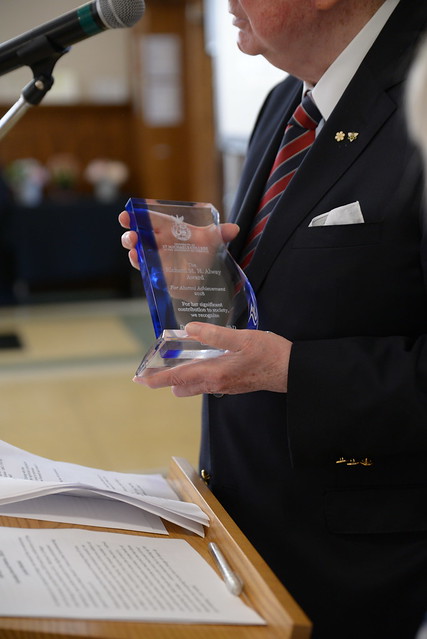
She has served in many roles for Catholic educational and charitable institutions, and she continues to serve in board and/or committee member roles with organizations such as the Arts and Letters Club or Toronto, the Toronto Hunt Club, and the Advisory Committee of the Canadian Business Ethics Research Network at York University.
Named for past St. Michael’s President Dr. Richard Alway, a member of the USMC Class of 1962 and our first lay president, the Alway Award is given in recognition of alumni whose significant contributions to society bring esteem to them and to the College.
For her pioneering work in the field of Continuing Education in Canada, for her support of the mission of the University of St. Michael’s College, for the way she has helped shape the lives of her students, and for her many other achievements, St. Michael’s is proud to call Dr. Mimi Marrocco one of its own. The Alway Award is a small token of the College’s gratitude for her life and work.
Bonitatem et disciplinam et scientiam doce me, as the saying goes. The Latin statement comes from “the old Vulgate version of Psalm 118, v. 66,” Father F.A. Black wrote in an archival letter. He was explaining the existence of the motto in the institutional crest of St. Michael’s College, which dates back to 1879. Father Black then offered a translation: “Teach me goodness, discipline, and knowledge.”
Because of the close connection between the Basilian Fathers and St. Mike’s, which the Fathers founded with Bishop Charbonnel, the two communities shared this crest essentially in common until the early 20th century. The publication of the first St. Mike’s yearbook in 1910 saw the introduction of a new, slightly revised crest for the college, and the older Basilian crest became that of the St. Michael’s College School.
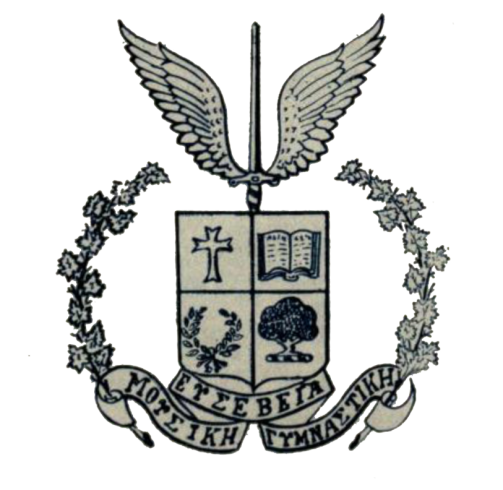
The 1910 crest of St. Michael’s College included a four-quartered shield topped with a winged sword. A script below the crest bore the school motto, translated into Greek from the original Latin in homage to the classical education many students pursued at St. Mike’s.
Moving clockwise from top left, the silver and blue quarters of the shield in the old St. Michael’s crest contain a cross, an open book, a tree, and a laurel. The cross refers to the school’s religious foundation and to the Basilian Fathers who worked tirelessly for the school from the earliest days of its existence. The book evokes the Basilians as well, but also “symbolizes learning, both sacred and profane,” as USMC President Father John M. Kelly wrote in a letter dated 1977.
The tree in the lower right quarter of the crest is taken from the Arms of the University of Toronto, and Father Kelly wrote that the laurel in the lower left corner “symbolizes art, culture, and excellence.” The winged sword is a traditional symbol for St. Michael, for whom the college was named.
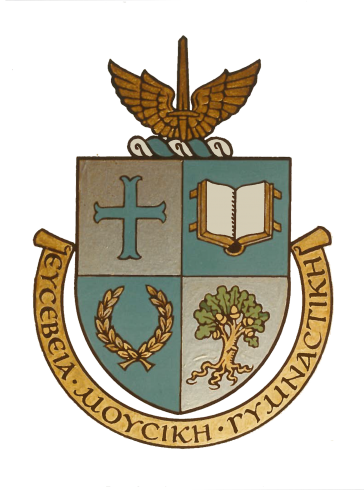
The crest of 1910 appeared on St. Mike’s letterhead, yearbook covers, and buildings for the following several decades, and the winged sword by itself often appeared in place of the full crest. In 1952 the crest—casually referred to as “the Arms,” though without a formal grant by Letters Patent, as Father Kelly noted—was formalized to mark the centennial of the school. A saucer purloined from the school’s cafeteria in 1965 and famously returned in 2010 also bears the school’s midcentury emblem.
In September of 1978, Father P.J. Swan, President of the University of St. Michael’s College, sent a design for a new Coat of Arms to the College of Arms in London, England. As reported in an article in The Mike in October of 1979, the College of Arms “has the legal privilege from the Monarchy to approve coats-of-arms throughout the Commonwealth.” The Queen approved the design for use on diplomas and other school-related documents in August of 1979.
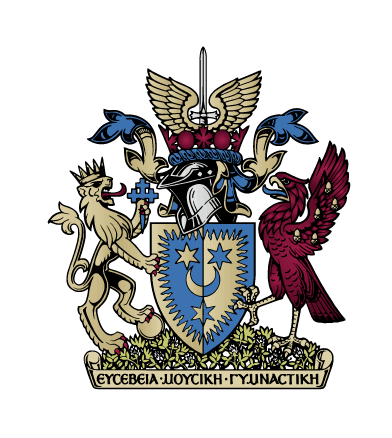
The school’s official Coat of Arms created controversy after it was announced. A group of alumni penned a letter opposing the new Arms to the editor of The Mike. Later, the Council of the Students’ Union also wrote a letter opposing the new Arms, saying “there already exists a suitable Coat of Arms for the symbol of the College” which could be seen “displayed above the door of Brennan Hall, in the tiles of the Brennan lobby, and on all the stationery.” In spite of opposition, St. Mike’s adopted its new Coat of Arms. The Globe and Mail reported on the formal presentation of the Arms in December 1980.
Today, the official Coat of Arms adorns the gate that opens onto Elmsley Place. In the office of the president, it hangs above the official proclamation from the College of Arms, which was penned in beautiful calligraphy. The old crest, however, remains above the door to Brennan Hall.
Though the official St. Mike’s Coat of Arms will remain on file in London unchanged, the school has decided to return to its roots with a new crest.
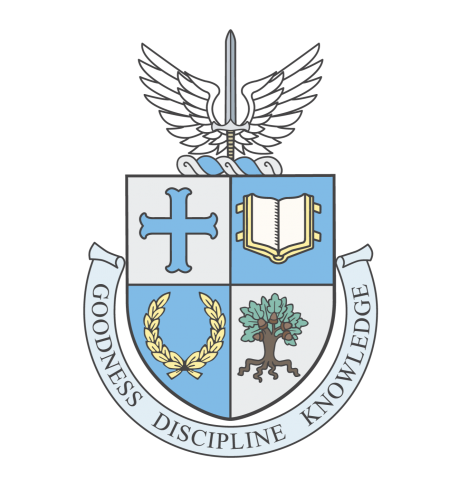
The new crest is actually an old one. Created by design studio Wise & Hammer on the model of the 1952 design, the new crest of the University of St. Michael’s College hearkens back to the emblem that first appeared on a yearbook cover in 1910. It includes the same quartered shield, the same images in the quarters, and the same winged sword. “Goodness, Discipline, Knowledge”—the distilled essence of the Basilian motto—will appear in English in a script below the shield, upholding the school’s tradition of excellence while making the words accessible to those who do not read Greek.
St. Mike’s will also have use of a new script logo in double blue, the school’s original two-tone colour motif. This script will appear on school merchandise and sports jerseys.

The new design honours the history of the college and affirms the continuity of the school’s traditions that now extend over 165 years.
St. Michael’s rose to prominence as a center of the Catholic intellectual tradition under the sign of the quartered shield and winged sword. With the reintroduction of this design, the school both celebrates its Basilian legacy of achievement and invites its current students to join in creating the history of the school’s next era.

